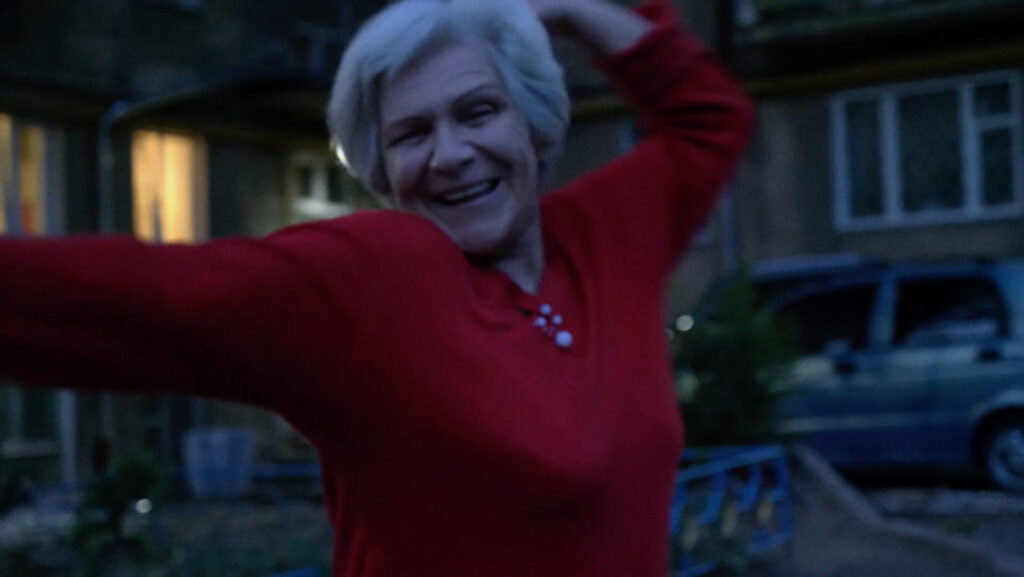
Still from Anya Zalevskaya’s Posle priliva (2020). Courtesy of the director.
In the fall of 2019 I was newly living in the Midwest. In my free time, I’d take long, aimless walks, trying to tune to the flat cold of the place. On one such walk I got a call from my friend Anya Zalevskaya; she was in Odesa, she said, working on a film, a documentary about the Ukrainian (but also Romanian, Jewish, and Soviet) director Kira Muratova. When Anya called, it was almost midnight in Odesa. She was sitting on a bench by the Black Sea; I could hear the waves, the inhale of her cigarette. What film of Muratova’s should I watch first? I asked her. Ah, she said, The Asthenic Syndrome, for sure.
1990’s The Asthenic Syndrome takes us to Odesa, too, but this is an Odesa at the fraying edge of a Soviet time-space where, significantly, we never see the sea. The film is shot in places that suggest a borderland, an edge, a wobble: construction sites, mirrors, photographs, headstones, film screenings, cemeteries, a dog pound, a hospital ward, a soft-porn shoot. This in-between sense is temporal, as well: Muratova notes that she “had the great fortune of working in a period between the dominance of ideology and the dominance of the market, a period of suspension, a temporary paradise.” As with the asthenic syndrome itself (a state between sleeping and waking), the film is a realization of inbetweenness, an assembly of frictions and crossover states we feel through form: through Muratova’s use of juxtaposition; through her uncanny overpatterning of echoes and coincidences; through the shifts of register between documentary and opera. The film doesn’t proceed so much as weave itself in front of us, in a dazzling ivy pattern of zones and occurrences. You could call it late-Soviet baroque realism.
The film is really two films. The first, in black and white, opens out into a funeral. It’s for the husband of Natasha, we learn—a middle-aged woman possessed, in the ensuing scenes, to the very end of herself with grief. Because grief invents the road it travels, Natasha—like her audience—does not herself know what she will do next. With terrifying speed, she quits her job as a doctor, insulting coworkers in the process; takes a drunk home, tells him to strip, beds him; shoves and insults passersby. All this is captured in the camera’s eye, however, with a disinterested dignity. And then, abrupt as Natasha’s shoving, the first film breaks into the second (I’ll leave you to see the how and the why—it’s great).
At the epicenter of the second film is the exhausted Nikolai, a schoolteacher who nods off in moments of emotional intensity. Occurrences flare up around Nikolai like religious antimiracles—a carp torn apart by female fingers as “Chiquita” plays, a high school boy imitating a game show host, the agonizing panorama of the dog pound. This is the social and inner world in abjection, yes: but because abjection is possible, the film seems to say, so is human dignity. The question of dignity binds the viewer to the film’s concern: what is the human when it is shorn of category, of psychology, of system? What are we when we are together? What are we when we are alone?
In the rare interviews she gave, Muratova often mentioned her philosophy of film: what she called dekorativnost’ (ornamentedness) and sherokhovatost’ (roughness). (Thanks to Mikhail Iampolski’s 2021 talk “A World without Reality” for many of the Muratova quotes here.) The viewer, Muratova thought, should encounter the film’s reality as an ornament, a woven carpet, a fabric: completely antisymbolic, and thus anti-ideological; completely antipsychological, and thus antistereotypical. Reality itself, she argued, can only be looked at, admired—not interpreted, understood, or possessed. Reality doesn’t “mean,” it is. As when, in an interview, Muratova is asked: “What do the horses in your films symbolize?” To which she replies: “What do the people symbolize?”
There’s no neat ending possible here in good faith; rhetoric and delicacy are insults to the present situation, and if the Black Sea that I heard over the phone in 2019—unsymbolic itself—still crashes and breaks as it always has, it sounds differently now in the human ear. Anya’s remarkable short film, Posle priliva (After the Tide, available with English subtitles here) is a pursuit of reality in Muratova’s footsteps that trusts in the uses of intuition, coincidence, error, and attention. Like Muratova, Anya immerses herself in the reality the film pursues—in this case, Odesa in 2019—and in the people, encounters, scenes, and things that this reality happens to make available in a given moment. She gives herself over to what will disclose itself; she’s not so much seeking something as she is listening, with intuition’s ear, for the inevitable that is the soul of chance. Neither of their films are ever “random,” and therein lies their art. Posle priliva came out in 2020. In 2023, it has become an elegy to a time and place, a specter and a document of what was. Not unlike The Asthenic Syndrome, which has come to mark a period (late perestroika, pre-collapse) that now haunts in its total irrecoverability.

Still from Anya Zalevskaya’s Posle priliva (2020). Courtesy of the director.
Timmy Straw is a poet, musician, and translator. Their poems “Brezhnev” and “Oracle at Dog” appear in our new Winter issue, no. 242.
from The Paris Review https://ift.tt/U5MxBwY
Comments
Post a Comment